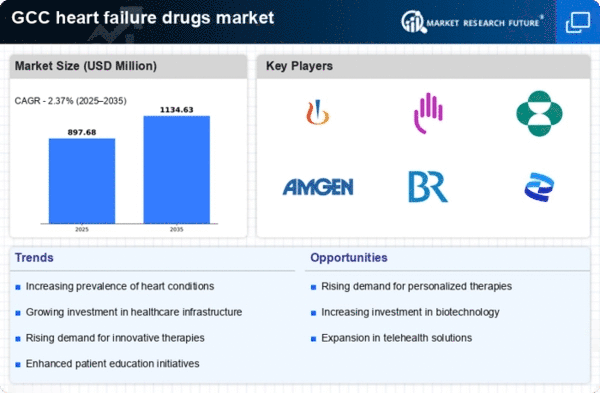Rising Geriatric Population
The rising geriatric population in the GCC is a significant driver of the heart failure-drugs market. As life expectancy increases, the prevalence of age-related health issues, including heart failure, is also on the rise. Older adults are more susceptible to cardiovascular diseases, necessitating effective management strategies and treatment options. This demographic shift is prompting healthcare systems to adapt and expand their services to cater to the needs of the elderly. Consequently, the demand for heart failure drugs is expected to grow as healthcare providers seek to address the unique challenges associated with managing heart failure in older patients. This trend indicates a robust future for the heart failure-drugs market as it aligns with the evolving healthcare landscape.
Advancements in Medical Technology
Technological advancements in medical devices and drug delivery systems are playing a pivotal role in the heart failure-drugs market. Innovations such as remote monitoring devices and telemedicine solutions enhance patient management and adherence to treatment regimens. These technologies facilitate timely interventions and improve patient outcomes, which is crucial in managing heart failure. The integration of artificial intelligence and machine learning in drug development processes also shows promise in identifying new therapeutic targets. As these technologies become more prevalent in the GCC healthcare landscape, they are likely to enhance the effectiveness of heart failure treatments. Consequently, this could lead to an increase in the adoption of heart failure drugs, further propelling the market forward.
Growing Awareness and Education Initiatives
There is a notable increase in awareness and education initiatives regarding heart failure in the GCC region. Healthcare organizations and governments are actively promoting heart health through campaigns aimed at educating the public about the risks and symptoms of heart failure. This heightened awareness is likely to lead to earlier diagnosis and treatment, which is essential for improving patient outcomes. As more individuals seek medical attention for heart-related issues, the demand for heart failure drugs is expected to rise. Furthermore, educational programs targeting healthcare professionals are enhancing their ability to manage heart failure effectively, thereby increasing the overall market for heart failure-drugs. This trend suggests a positive outlook for the industry as awareness continues to grow.
Increasing Prevalence of Cardiovascular Diseases
The heart failure-drugs market is experiencing growth due to the rising prevalence of cardiovascular diseases in the GCC region. Factors such as sedentary lifestyles, unhealthy diets, and increasing obesity rates contribute to this trend. According to recent health statistics, cardiovascular diseases account for a significant portion of mortality in the GCC, with heart failure being a leading cause. This alarming trend necessitates the development and availability of effective heart failure therapies. As healthcare systems in the region adapt to this growing burden, investments in the heart failure-drugs market are likely to increase, leading to a wider array of treatment options for patients. The demand for innovative and effective medications is expected to rise, thereby driving market growth and encouraging pharmaceutical companies to focus on this critical area of healthcare.
Supportive Healthcare Policies and Reimbursement Frameworks
Supportive healthcare policies and reimbursement frameworks in the GCC are fostering growth in the heart failure-drugs market. Governments are increasingly recognizing the economic burden of heart failure and are implementing policies to improve access to essential medications. Enhanced reimbursement schemes for heart failure treatments are encouraging healthcare providers to prescribe these drugs more frequently. This supportive environment is likely to stimulate market growth as pharmaceutical companies are incentivized to invest in research and development of new heart failure therapies. The alignment of healthcare policies with the needs of patients and providers is crucial for the sustainability of the heart failure-drugs market in the region.
















